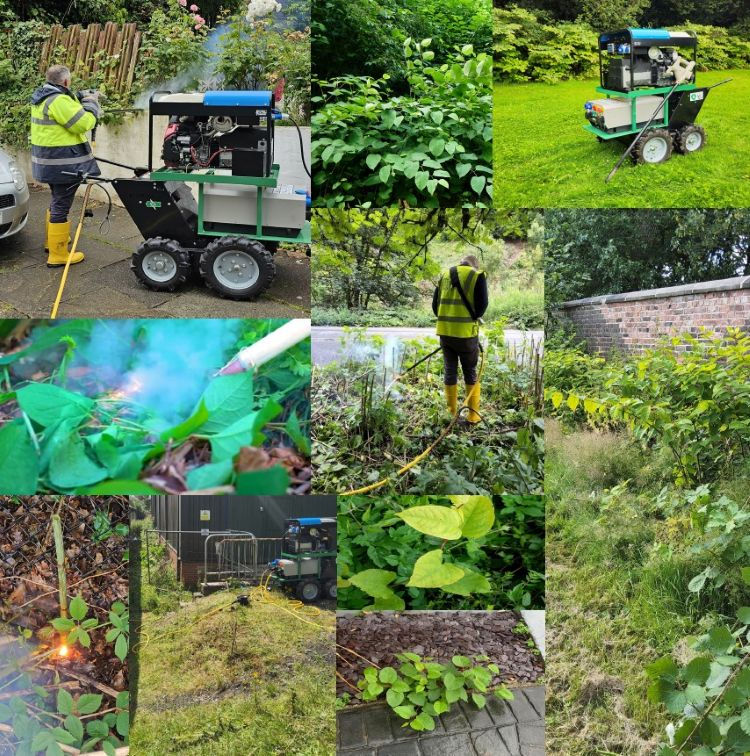Award-Winning Chemical-Free Control Revolutionizing UK’s Invasive Weed Industry
- Brainz Magazine

- Aug 5, 2025
- 4 min read
Invasive plants are one of the UK’s most persistent environmental challenges, and none more notorious than Japanese Knotweed. Capable of pushing through tarmac, damaging property foundations, and spreading rapidly via its deep rhizome system, it has long posed a costly problem for homeowners, councils, developers, and conservation agencies.

For decades, the default solution has been glyphosate-based herbicides, a chemical approach that can take years to work and seemingly rarely kills knotweed, also carries environmental risks, and more recently is said to be the cause of human conditions such as ADHD and Autism, and often fails to prevent regrowth. But in 2025, things are changing.
The Japanese Knotweed Agency (JKWA) was recently named Weed Removal Specialists of the Year at the Manchester & North West England Prestige Awards, recognising their pioneering role in bringing chemical-free thermo-electric treatment to the mainstream. While JKWA did not invent the technology, they were and are the first UK company to adopt it and lead its application in the fight against invasive plants.
A new approach for a new era
Thermo-electric treatment works by delivering precisely controlled, directed heat straight into the plant’s stem and rhizome, causing internal cell damage and depleting energy resources with each treatment until the weed dies off completely and composts away into the ground. Unlike chemical methods, it does not rely on toxins. This means it’s safe for use in Special Areas of Conservation, near watercourses, schools, organic farmland, and other sensitive sites.
The method has gained such recognition that it is reported His Majesty The King has adopted the same technology on his Royal estates for environmentally sensitive invasive plant control.
Because the heat penetrates deep into the rhizome system, the risk of regrowth is greatly reduced, making it one of the most effective long-term solutions available today when worked into a weed management plan. While a single treatment will not instantly eradicate Japanese Knotweed, thermo-electric control represents a major leap forward in sustainable weed management and eradication.
According to DEFRA and the Environment Agency, Invasive Non-Native Species (INNS) cost the UK economy an estimated £4 billion annually, including crop damage, flooding, biodiversity loss, and removal costs. Japanese Knotweed alone is estimated to account for around £170 million of that total, with property devaluation making up a significant share. Studies have shown that affected homes can lose between 5-15% of their market value, translating into billions in lost property value nationwide.

Beyond Japanese knotweed
While Japanese Knotweed remains JKWA’s most common challenge, with the Japanese Knotweed National Register managed by JKWA, having grown this year up to 70,000+ reported sightings, it is just one of 58 invasive plant species now officially recorded in the UK. JKWA is conducting thermo-electric treatment case studies on various invasive species such as Himalayan Balsam, Giant Hogweed, Rhododendron, and Laurel, all of which threaten biodiversity, waterways, and native habitats.
The goal is simple: to prove that environmentally responsible, chemical-free eradication can become the new standard for invasive species management nationwide.
Case studies in action
JKWA collaborates with organisations including South East Water, Derbyshire Wildlife Trust, and the RSPB’s Lake Vyrnwy Nature Reserve to deliver and trial non-chemical invasive plant control in some of the UK’s most sensitive and protected environments. These projects demonstrate not only environmental protection but also the practicality and scalability of the thermo-electric approach.
Why this matters to every homeowner and business
Japanese Knotweed isn’t just a plant problem; it’s a legal, financial, and environmental issue that can affect anyone. The Environment Agency warns that allowing Knotweed to spread from your land is an offence that could result in enforcement action.
Mortgage lenders often refuse loans on properties with untreated Knotweed, leaving buyers and sellers stuck. For affected property owners, this can mean a market value drop of 5-15%, sometimes tens of thousands of pounds. For local authorities, utilities, and developers, it can mean spiralling project delays and budget overruns.
At JKWA, we view chemical‑free, proactive control as not just an environmental responsibility but as an investment in protecting communities, property values, and the UK economy.

Did you know? Fast facts about invasive weeds in the UK
£4 billion: Estimated annual cost of Invasive Non‑Native Species to the UK economy (DEFRA).
£170 million: Annual cost attributed to Japanese Knotweed alone, including removal and property devaluation.
70,000+: Recorded sightings on the Japanese Knotweed National Register, managed by JKWA.
5–15%: Typical property value reduction when Knotweed is present.
1st in the UK: JKWA was the first to adopt thermo‑electric treatment for Knotweed removal nationwide, and seemingly still the only company heavily invested in this technology.
Royal approval: It is reported that His Majesty the King uses the same technology on his estates.
Changing the industry mindset
For too long, invasive weed campaigns have centred on chemical control. At JKWA, the belief is that working with nature, not against it, is responsible and delivers lasting impact.
Their recent award is more than just recognition; it’s a sign to industry professionals that chemical-free control is both viable and urgently needed.
If you have concerns about Japanese Knotweed or other invasive plants, visit here.
Or call freephone 03335 777 888 to speak to our AI Expert Jodie or one of our expert team.


.jpg)






